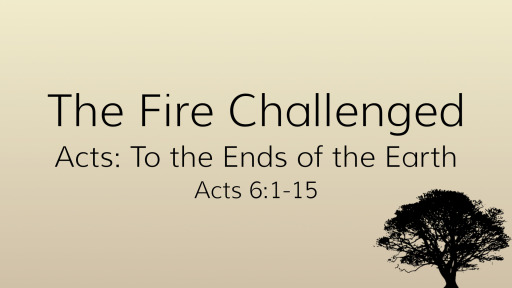The Fire Challenged

I. Stephen the Deacon (1-7)
A. Complaint in the Church (1)
In its charity the church may have followed somewhat the precedents already set in contemporary Judaism, which had a double system of distribution to the needy. The Jews had a weekly dole for resident needy, called the quppah. It was given out every Friday and consisted of enough money for fourteen meals. There was also a daily distribution, known as the tamhuy. It was for nonresidents and transients and consisted of food and drink, which were delivered from house to house where known needy were dwelling. The Christian practice seems to have embraced elements of both Jewish systems. Like the tamhuy it was daily, and like the quppah it was for the resident membership.
B. Solution by the Apostles (2-4)
To oversee the distribution to the Hellenist widows would distract them from their primary responsibility of witness. The phrase “it would not be right” really means “not pleasing in God’s eyes.”
The word “table” was characteristically used as a metaphor for a meal or for a table from which money was distributed. Either practice could have been followed by the church
Their qualifications here are threefold:
1. Of good reputation
Reputable
2. Full of the Holy Spirit
Spiritual
3. Full of wisdom
Practical
C. Agreement by the Church (5-6)
D. Results in the Community (7)
II. Steven the Target (8-15)
A. Because of The Power (8)
B. Because of the Wisdom (9-11)
Jews from many nations resided in Jerusalem in their own “quarters,” and some of these ethnic groups had their own synagogues. The freedmen (“libertines”) were the descendants of Jews who had previously been in bondage but had won their freedom from Rome.
